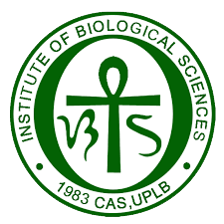History
The Institute of Biological Sciences (IBS) was created on March 23, 1983, by virtue of Executive Order 889, which established a system of national centers of excellence in the basic sciences. It was organized from the existing staff of the former Departments of Botany, Life Sciences and Zoology.
Since it began its operation on December 1, 1983, the IBS has grown and become more mature, continuing its full support for instruction, research and extension for a nationwide and even international clientele. Today it holds the distinction of handling the largest number of courses and students in the University. In recognition of its leading role, the Commission on Higher Education (CHED) confirmed its status as a Center of Excellence in Biology in 1999.
Through the leaderships notable directors, and more than 30 years of existence, IBS has found its rightful place in the scientific community, attaining a position of acknowledged leadership in instruction and research among the national centers of excellence in the basic sciences.
Mandate
As an academic and research unit of the University, its mandate is to:
- Support and undertake interdisciplinary basic research relevant to efficient management of natural resources;
- Conduct basic studies to promote the advancement of biological knowledge in a tropical environment;
- Continuously strive to upgrade and improve its undergraduate and graduate academic programs to make them relevant to current biological realities; and
- Extend research results and facilitate information exchange through the mass media and interpersonal means, as well as upgrade biology teaching in the nation’s educational system.
Mission and Vision
The Institute of Biological Sciences’ mission is to become a leading center for teaching, research and extension in biology in the Asian Region. Its vision is to have academic excellence in biology with relevance to present day needs for national economic development, productive ecosystems and improvement of human conditions.
The specific objectives of the Institute which strives to achieve the goal by way of excellent instruction, relevant and timely research, and effective extension is guided by the following goals and directions:
- To promote and produce principled critical thinkers and independent-minded faculty, staff, students, and graduates who will be leaders in their chosen fields of profession;
- To enhance local, national, and international recognition as a center for excellence in research and advance the frontiers of modern biology, and engage undergraduate and graduate students in cutting-edge research;
- To lead in multi-disciplinary biological research and strengthen interactions with other academic units, centers, and programs within UPLB and other UP campuses as well as forge strong linkages with other universities and research institutions in the country and abroad.

